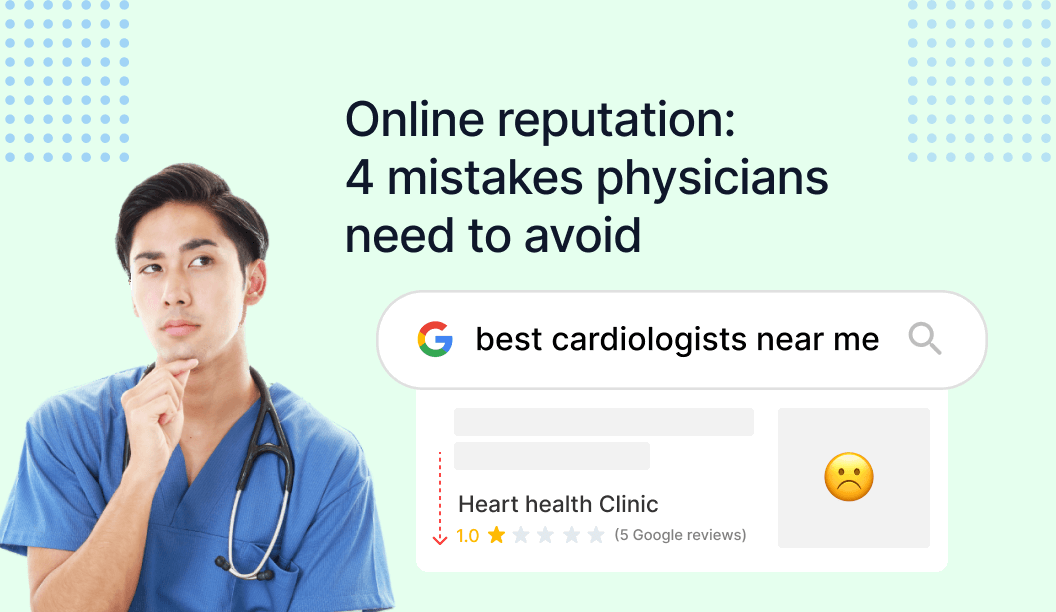As a physician, do you think patients find you through local directories and advertising? Then it’s about time you look at how patients find healthcare professionals today and how the lack of physician online reputation management is hurting your practice.
Over 77% of patients search using Google to find a specialist before booking an appointment. Even if the primary care physician sends you a referral, the patient will look up your reviews and ratings by other patients before making that appointment.
Online reviews are the new word-of-mouth, where the reviews help patients choose the right physician. More than 40% of patients are known to avoid a provider with poor reviews, and this percentage is increasing every year.
With consistent patient feedback, you can acquire new patients, build a strong online presence, and address negative feedback. Consistently high reviews indicate prospective patients that the existing patients are satisfied with the provider’s care. Here are the common mistakes to avoid if you are starting out building an online reputation.
This Blog Includes:
How Can Physicians Improve Their Online Reputation?
Patient feedback and managing physician online reputation play a crucial role in making a healthcare decision for most patients. Acquiring patient feedback and establishing your online presence by optimizing your website and the local listing will help your medical practice to be listed on the first page of Google.

According to Repugen’s Patient Survey 2021, ‘60% of patients check 10 or more reviews before deciding on a healthcare provider.‘
1. Ask patients to leave feedback soon after their visit
Be it an SMS feedback request, email, or phone call, collecting reviews improves your practice’s visibility to a broader audience. It can help build trust and transparency for prospective patients and enables you to understand the issues faced by your patients.
2. Maintain your website and SEO
Your website is the central hub where patients can learn about your practice’s providers, services, and features. Search Engine Optimisation and local listing are the key components that give you an edge over the competition.
3. Responding to reviews
Acknowledging patient reviews is a way to show that the patients’ are heard. 40% of patients expect a response for their review, whereas 1 in 5 patients disregard their negative review because the provider responded thoughtfully. The best reply must be concise, careful not to apologize or admit fault, and not to reveal any personal information.
4 Common Mistakes That Can Damage Your Reputation
Every healthcare practice needs an physician online reputation management system that sends feedback requests right after a visit, monitors and keeps track of incoming reviews, and more. That’s where we can help you. Read on to know if you are unknowingly making these common mistakes that can damage your reputation.
1. Denying the importance of patient reviews.

The survey on how patients use online review states that the key factor used by patients to evaluate healthcare professionals are online reviews.
71% of patients look for a provider’s online reputation before booking an appointment, out of which 37% said they used Google Reviews.
Reviews and referrals have always been the trusting element for the general public. Denying the value of patient reviews can cause the loss of new patients and a decline in existing patients, as you need to be aware of their concerns. Learning to absorb both positive and negative reviews will help your practice grow.
2. Not verifying healthcare information and listings
The first thing a patient does before booking an appointment is to search for them online. You are losing out on new patients if you have not verified your practice and have yet to optimize your practice listings. Failing to claim and manage your Google local listing is a common yet wrecking mistake.
Having different information on various platforms can be confusing and frustrating for patients. You need to check your listings, verify your clinic name, address, and phone number, and drive traffic to your website.
3. Not asking patients for feedback

How will you know if your patients are satisfied with your service? How can your patients let you know if they have any concerns about the service? How can you attract new patients and build trust? This is why it is essential to ask for patient feedback.
Your online reputation suffers a great deal when you don’t ask for patient feedback. Google is the most frequently used search engine by patients to research, so you must focus on Google to build your reputation.
81% of patients consider online reviews when selecting a healthcare provider.
Of the 81%, 62% of patients who check online reviews are age 60 and above. This will gradually increase in the coming years. Have a consistent, preferably free automated platform like Trillium.health to reach out to your patients after their visits and get their feedback.
4. Neglecting negative reviews
Providers often neglect negative reviews either because they do not feel the need to or due to concerns about HIPPA compliance. However, responding to negative reviews is a way to reconcile a patient relationship, show prospective patients that you listen, and find ways to improve the patient experience.
Rather than overlooking negative feedback, respond briefly and do not overshare any patient or provider information. Even if it is compelling to apologize, do not say sorry nor admit fault. Instead, ask the patient to call the office manager directly to address their issues.
Finally, the best way to mitigate negative feedback is to have a far higher number of positive reviews. This goes back to the earlier point about having a consistent, preferably automated, solution to build positive reviews and keep a high average rating.



